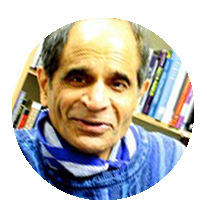 |
Office: |
Faculty of Health Sciences, Michael DeGroote Centre for Learning and Discovery – 3300H |
Email: |
chari@mcmaster.ca | |
Phone: |
905-525-9140 ext. 21559 | |
Office Hours: |
Mondays 11:20am-12:20pm | |
Dr. P.K. Rangachari is Professor (Emeritus) of Medicine, who returned to Arts & Science in 2019-20 to teach ARTSSCI 4CT3 / Medical Humanities Inquiry.
The events of the past year threw into sharper relief the value of a program such as Arts & Science, which gets students to savour the wisdom of the past and prepares them for exciting yet uncertain futures. That word “unprecedented” thrown around like confetti made me cringe. It showed how an abysmal ignorance of the past coupled with an excessive reliance on ephemeral tweets can confuse, frighten, and muddle, giving license for profiteering to flourish. Plague, cholera, smallpox, and polio have evoked precisely that combination of fears, hopes and untruths that COVID did. Nothing new. Collective amnesia reigned. What was needed was a good dose of healthy scepticism, an awareness of the past and the skills to sift grain from chaff—much of that provided by this program.
I am acutely conscious of the past. Mine was foreign in more ways than one. I was lucky that I grew up in India, a statement that may raise serious concerns about my sanity but is nevertheless true. I did not suffer summer camps, obligatory sports clubs, or orchestrated social activities. Only a delightful sense of freedom. I doubt if I would have survived a North American childhood without serious counselling. I was a true JD. At the age of 10, I found myself wandering parks rather than attending classes; no truant officer cross-checked my whereabouts. My parents summoned by the school principal were seriously concerned, but fortunately that delinquent phase passed, and I quickly morphed into a bookish nerd just as I reached high school.
I drifted into a medical school, though I had little or no social skills, had no desperate desire to help people, save the world or do good to man or beast. A series of muddles derailed my attempts to get into a chemistry program at Delhi University, pushing me into a pre-med course. Fortunately, I got into the All-India Institute of Medical Sciences, New Delhi (1966), the best medical school in the country which had marvellous teachers with stellar records, who showed me the excitement and fascination of scientific research. Following my internship, I went to the U of Alberta to complete my Ph.D. in Pharmacology. Though not the most inviting of places, I had excellent mentors. With a Ph.D. in hand, I went onto the Cardiovascular Research Institute (CVRI) in San Francisco. The Nixon-Kissinger-Watergate years were exciting times to live in the US, particularly in California and the research atmosphere was exhilarating. But in those days a J-1 visa was a limiting factor and my wanderjahrs continued—Hopitaux Necker and Bichat, Paris, Delhi University, Beth Israel Hospital, Harvard Medical School, Boston till I finally landed at McMaster University in 1983, for a single year that stretched to more than half my professional life. Till then, I had worked in research institutes for over 15 years, with little or no contact with students. My professional life underwent a phase transition when I saw problem-based learning in practice and got involved in teaching in a variety of programs, undergraduates (life sciences, health sciences, Arts & Science), medicine, nursing, physiotherapy, pharmacy, and biomedical engineering
I have sought to bridge the two cultures (the sciences and the humanities) by encouraging students to express their learning through more creative outlets (conversations, stories, plays, poems). My courses have linked toxicology with creative writing, taste receptors with anthropology, and my students have used archival material to deconstruct the antecedents of medical technology (see Adv. Physiology Educ 35:323-9, Interdisciplinary Journal of Problem-Based Learning, 7(1). 186-202Adv Physiol Educ 39: 288–294, 2015; Mol. Interventions 10 (6) 336-34, https://www.youtube.com/watch?v=_N7Y3UBy48I)
Teaching has been both enjoyable and rewarding (3M Fellowship, OCUFA award, President’s Award from McMaster University, Claude Bernard Lectureship from the American Physiological Society, IUPHAR-Teaching Award, several MSU awards, including one given by the Arts & Science students).
I tend to see the world in molecular terms and spent decades of my research life working on membranes and ion transport, using Ohm’s law daily. The essence of that law is the linkage between driving forces, flows and ease of flow. So, I am conditioned to think of fluxes. There is a wonderful Greek expression, attributed to Heraclitus—panta rhei, or “everything flows.” Social pressures drive actions and institutions either simply help or hinder. The pandemic has exposed some fault lines and whether Universities as we know will exist is moot. Hamlet gave good counsel: defy augury. The readiness is all.
Books (co-edited):
David, T.J., Patel, L., Burdett, K., Rangachari, P.K. (1999) Problem-based learning in Medicine. Royal Society of Medicine, UK
Dorsey, K.J., Rangachari, P.K. (2012) Students Matter: The Rewards of University Teaching, SIU Press, USA.
Rangachari, P.K., Johnson R (2020) Student Centred Learning: Subversive Teachers and Standardised Worlds, Open Library, Press Books, Ontario
